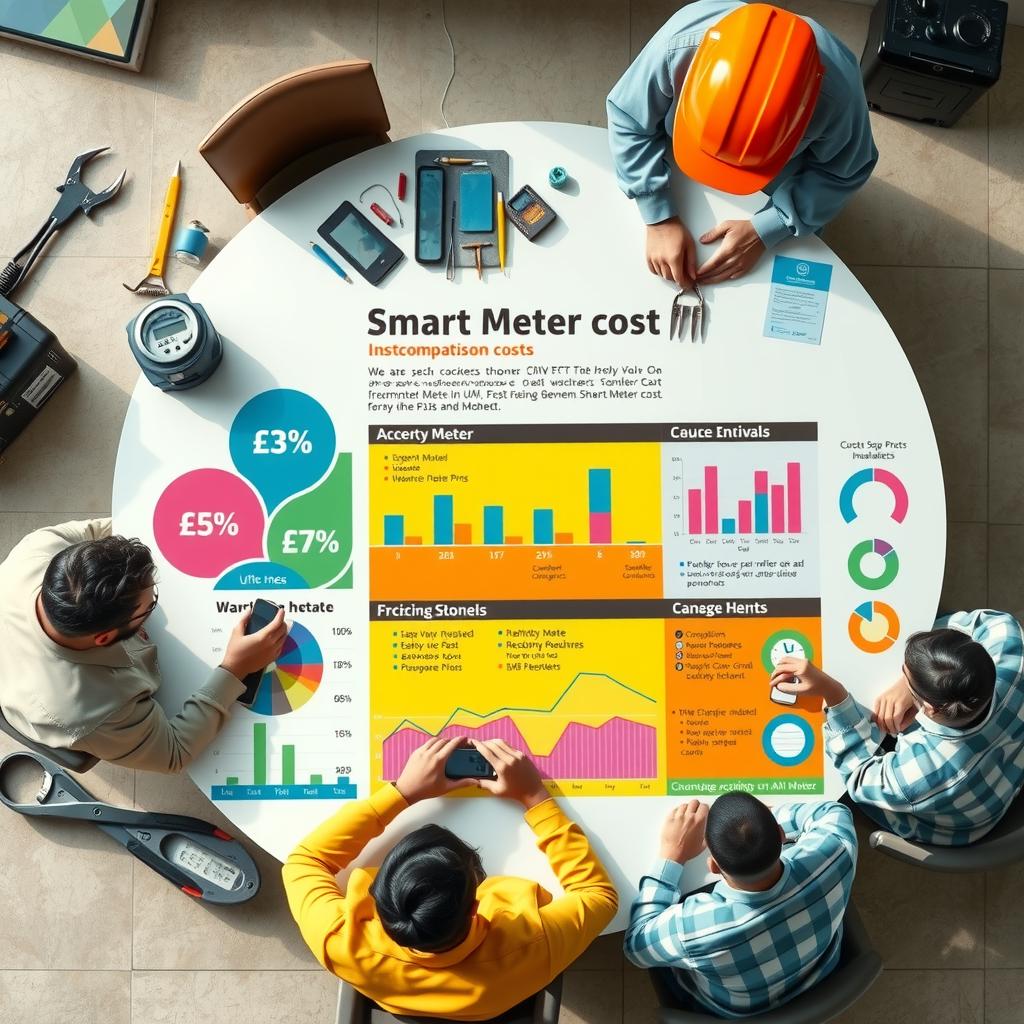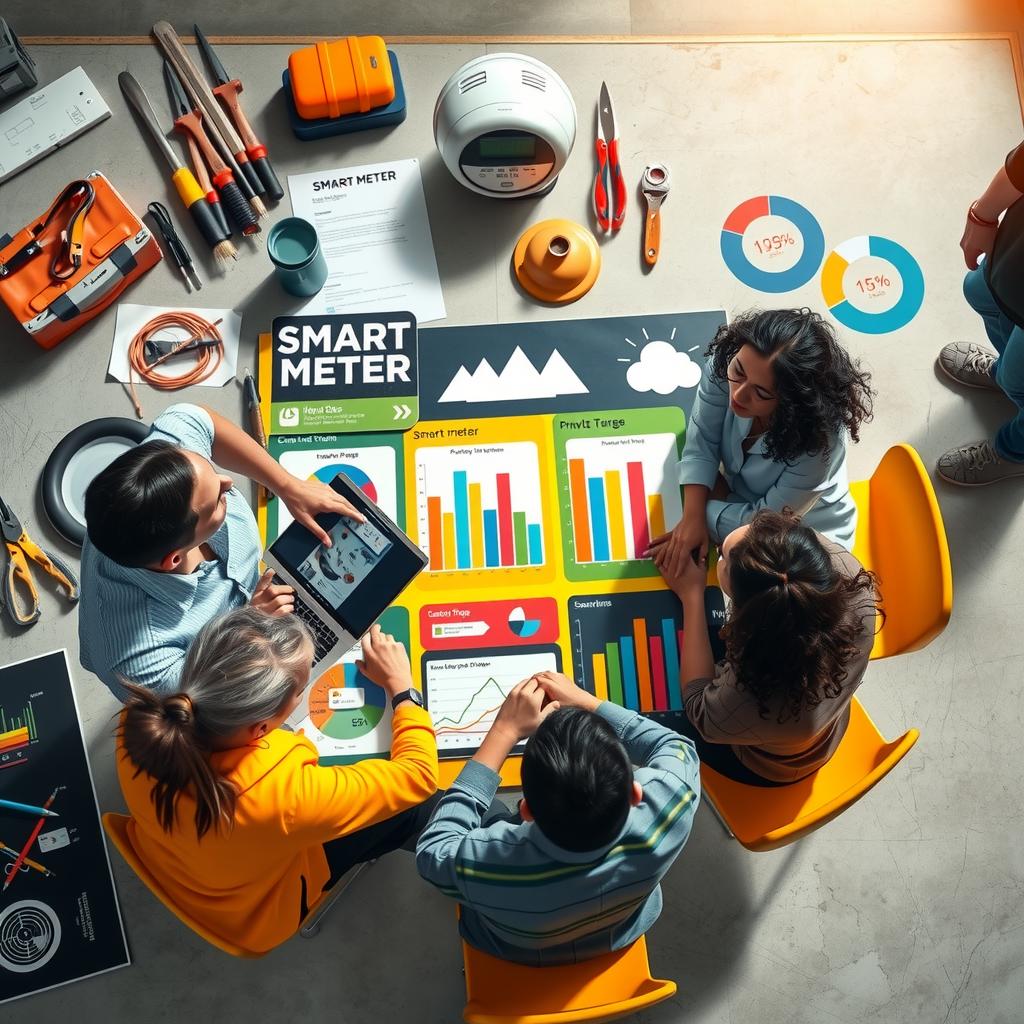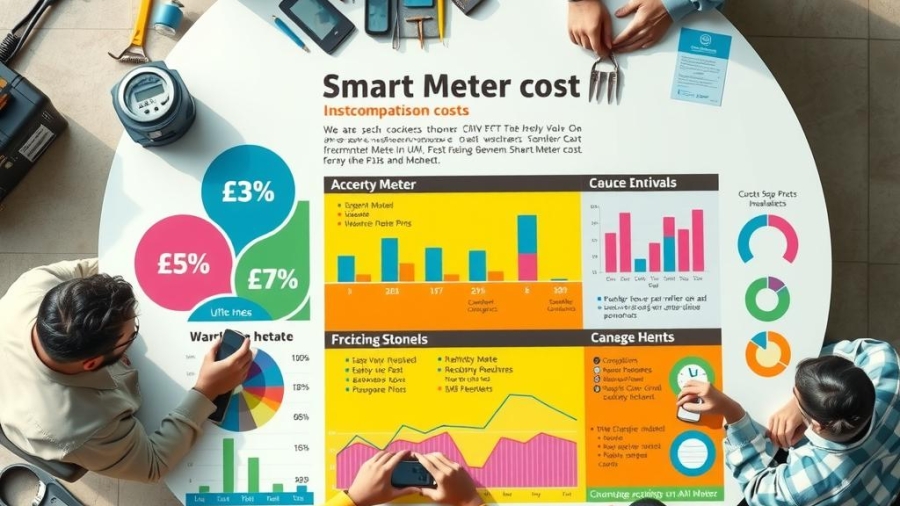In an age where energy efficiency and smart technology are not just trends but essential components of modern living, understanding the smart meter installation cost can significantly impact homeowners’ decisions. As utility management evolves, traditional methods of monitoring energy consumption are giving way to innovative solutions like the smart meter, which offers real-time data that empowers users to make informed choices about their energy usage. However, with various options available in the market, potential buyers may find themselves questioning: How much will it actually cost to install a smart meter, and what factors contribute to these costs?
This guide aims to demystify the complexities surrounding smart meter installation costs by providing a comprehensive comparison that highlights key aspects such as pricing variations based on different models and services offered by utility providers. By delving into this topic, readers will gain valuable insights into how investing in a smart meter can lead not only to immediate changes in household energy efficiency but also long-term savings through better resource management.
Readers may wonder if switching from traditional metering systems is worth the investment. The answer lies within understanding both upfront costs and potential benefits tied directly to improved home automation capabilities that many smart meters provide. From tracking daily consumption patterns for enhanced budgeting strategies to exploring innovative metering solutions aimed at reducing wasteful practices—this guide promises clarity amidst confusion.
As we move forward in this exploration of installation costs associated with smart technology, it becomes crucial for homeowners seeking effective ways to manage utilities while optimizing their expenses. With numerous variables influencing pricing structures—from geographical location and labor rates down to specific features included—it’s vital for consumers to equip themselves with all necessary information before making any commitments.
Join us as we navigate through this comparative analysis of smart meter installation costs, unveiling essential details that could influence your decision-making process while ensuring you stay ahead in achieving optimal energy savings within your home environment.

Key Points: Essential Insights into Smart Meter Installation Costs
In the realm of modern energy consumption, understanding the financial implications of installing a smart meter is crucial for homeowners and businesses looking to enhance their utility management. The installation cost can vary significantly based on several factors, making it essential to conduct a thorough cost comparison before making a decision.
One of the primary considerations in assessing installation costs is the type of smart meter being installed. Different models may come with varying features that impact both initial expenses and long-term benefits such as improved energy efficiency. For instance, advanced metering solutions equipped with smart technology not only provide real-time data but also integrate seamlessly into existing home automation systems. This technological integration might incur higher upfront costs but could lead to substantial savings through optimized energy usage over time.
Labor charges also play a significant role in determining overall installation costs for smart meters. Depending on geographical location and installer expertise, these labor fees can fluctuate widely. By obtaining multiple quotes from qualified professionals, consumers can engage in an effective cost comparison that ensures they are not overspending while still achieving quality installation services.
Furthermore, evaluating potential long-term financial benefits associated with adopting a smart meter is vital for informed decision-making. While there may be an initial investment involved in purchasing and installing this advanced technology, the resulting energy savings often outweigh those upfront costs significantly. Homeowners who monitor their consumption patterns more closely tend to identify wasteful habits early on—leading ultimately to reduced utility bills.
By exploring these facets—device types, labor charges, and future savings—this guide aims to empower readers in navigating through their choices regarding smart meter installations effectively. With comprehensive knowledge about how each factor affects overall expenses linked directly to utility management, individuals will be better positioned to make strategic decisions that foster sustainable living practices while keeping finances intact.
In conclusion, understanding the dynamics surrounding smart meter installation costs enables consumers to transform what could initially seem like an overwhelming choice into manageable steps towards smarter resource utilization at home or within commercial spaces alike.

Understanding Smart Meters
Revolutionizing Energy Consumption Monitoring
In the age of technology, smart meters are rapidly becoming an integral part of utility management systems across the globe. These advanced metering solutions offer unprecedented capabilities for monitoring energy consumption patterns in residential and commercial settings. By providing real-time data on energy usage, smart meters enable users to make more informed decisions about their consumption habits, ultimately leading to enhanced energy efficiency. Unlike traditional meters that only capture total usage over a billing cycle, smart meters continuously record electricity use and transmit this information back to utility companies via secure networks. This capability not only facilitates precise billing but also empowers consumers with insights into their daily energy habits.
The installation cost associated with smart meter technology varies significantly based on factors such as location and existing infrastructure, but it represents a worthwhile investment for many households seeking long-term savings. A comprehensive cost comparison reveals that while initial expenditures may be higher than those for conventional meters, the potential for substantial energy savings justifies the upfront investment. For instance, studies indicate that homes equipped with smart technology can reduce their overall energy consumption by up to 15%, translating into significant financial benefits over time.
Furthermore, integrating home automation systems with smart meter functionalities enhances user experience by allowing homeowners to manage their energy use dynamically through mobile applications or web platforms. Users can receive alerts regarding peak usage times or unusual spikes in consumption—information crucial for adjusting behaviors and curbing unnecessary waste. Additionally, these tools often provide detailed analytics on historical usage trends, enabling individuals to identify areas where they could further optimize their energy practices.
As cities strive toward sustainability goals and reduced carbon footprints, the role of smart meters becomes even more critical within broader utility management strategies. With utilities now able to collect vast amounts of data from millions of devices simultaneously—thanks largely to advancements in IoT (Internet of Things) technologies—the possibilities for improving grid reliability and resource allocation become practically limitless. Moreover, predictive analytics powered by this data allow providers not only to respond swiftly during outages but also anticipate future demand patterns effectively.
Investing in metering solutions like smart meters contributes significantly towards creating a more responsive power grid capable of accommodating renewable resources while minimizing environmental impact—a key component in fostering sustainable living practices worldwide. As communities adopt these innovative technologies en masse, it is evident that understanding how smart technology functions will play a pivotal role in shaping responsible consumer behavior moving forward.
Embracing Change: The Future is Now
How Smart Meters Influence Energy Behavior
The transition from traditional metering systems towards smart meter installations marks a transformative shift within both individual households and larger societal frameworks regarding resource management principles. One notable aspect is how these devices influence consumer behavior through transparent access to relevant information about one’s own power usage compared against peers or previous months’ averages; this knowledge fosters greater accountability among users striving toward lower bills or greener lifestyles.
Moreover—and perhaps most importantly—this newfound awareness cultivates proactive engagement concerning overall household efficiency measures; once armed with actionable insights drawn directly from real-time feedback offered by advanced digital interfaces linked directly alongside each home’s unique appliance profiles via internet connectivity layers inherent throughout current designs today—it becomes easier than ever before too adopt best practices when utilizing various electric-powered gadgets found around any given residence!
Ultimately though while there are indeed challenges ahead including questions surrounding installation costs versus corresponding long-term advantages gained through improved operational efficiencies alongside necessary adjustments made aimed at optimizing performance levels achieved thereafter… embracing change remains essential if we wish harness our collective potential fully! As such understanding precisely what makes modern innovations like those embodied within smarter energization methodologies truly revolutionary serves foundational purposes aiding efforts dedicated ensuring brighter futures await generations yet unborn!

Understanding Installation Costs
Analyzing the Components of Installation Expenses
When considering the installation of a Smart meter, it is essential to break down the various cost factors that contribute to overall expenses. The first significant element in this equation is the type of device itself. Different models of Smart meters come with varying features and capabilities, which can dramatically influence their pricing. For instance, advanced Smart meters equipped with real-time data analytics or integration with home automation systems tend to be on the higher end of the price spectrum compared to basic metering solutions. This variation underscores how crucial it is for consumers to assess their specific needs before selecting a device.
The second major factor affecting installation costs revolves around labor charges. Hiring experienced technicians ensures proper installation and functionality, yet these specialists may charge different rates depending on geographical location and market demand. In urban areas where skilled labor may be scarce, installation fees could rise significantly compared to rural settings. Additionally, if extensive modifications are needed for existing electrical systems—such as upgrading wiring or panels—the additional labor costs can further inflate total expenses.
Device Variability and Pricing Structures
Another vital aspect influencing Smart meter installation costs is variability among manufacturers and suppliers. Each provider offers distinct pricing structures based on their product quality and customer service reputation; therefore, conducting thorough research becomes necessary when comparing options available in the market for energy efficiency solutions. Potential buyers should examine not only upfront prices but also long-term savings attributed to enhanced utility management through accurate metering technologies.
Furthermore, warranties and post-installation support often play an important role in determining value beyond just purchase price; thus consumers should weigh these aspects carefully against initial expenditures while making informed decisions about which model suits them best financially over time.
Labor Charges: A Significant Component
Labor charges represent another critical piece within this intricate puzzle regarding Smart meter installations—these costs encompass not merely technician fees but also any required permits or inspections mandated by local regulations prior to commencing work at residential sites across different jurisdictions. Some regions impose stringent guidelines aimed at ensuring safety standards during electrical upgrades; hence prospective homeowners might face unexpected financial burdens tied directly back into compliance requirements linked closely alongside professional service engagements throughout project timelines.
As such considerations unfold throughout planning phases leading up towards implementation stages involving sophisticated smart technology integrations like those featured prominently within contemporary smart grid frameworks—individuals will likely experience fluctuations concerning budgeting expectations resulting from unforeseen variables arising amid overall project execution processes encompassing both material acquisition alongside human resources allocation strategies prevalent amongst industry practices today.
Making Smart Choices: Cost Comparison Strategies
In navigating through complex terrain surrounding potential investment opportunities related specifically towards adopting innovative sustainable practices involving state-of-the-art energy monitoring solutions exemplified by products such as Smart meters, discerning savvy customers must leverage comprehensive cost comparison tactics effectively aligned toward optimizing available financial resources responsibly without compromising quality outcomes derived consequently from utilizing advanced technological applications now commonplace within modern homes aspiring towards greater sustainability objectives moving forward into future generations ahead!
Moreover emphasizing energy savings realized via precise consumption tracking provided seamlessly through intuitive interfaces seen widely across popular brands dedicated solely toward enhancing user experiences ultimately fosters increased consumer trust while promoting widespread adoption patterns reflective upon evolving attitudes present among environmentally conscious populations globally today exemplifying truly transformative societal shifts underway presently amidst ongoing advancements unfolding continuously shaping our shared destinies collectively!
Long-Term Benefits vs. Initial Investment
Evaluating the Future of Energy Management
In today’s rapidly evolving energy landscape, weighing immediate financial implications against potential long-term savings is crucial for homeowners and businesses alike. The initial investment in a Smart Meter can seem daunting, especially when considering installation costs that may not align with the current budgetary constraints. However, it is essential to recognize that this upfront expenditure paves the way for significant energy efficiency improvements over time. By utilizing Smart Technology, users gain real-time insights into their energy consumption patterns, which can lead to informed decisions regarding utility management and home automation strategies. As a result, households often experience substantial reductions in monthly bills through proactive monitoring and adjustments.
Furthermore, while the cost comparison between traditional metering systems and modern Smart Meters may initially favor lower-cost options, it is important to consider hidden expenses associated with outdated technology—such as increased utility rates due to inefficiencies or unanticipated maintenance fees. In contrast, investing in a Smart Meter ultimately contributes to enhanced sustainability efforts by minimizing wasteful practices and promoting responsible consumption habits among users. This aligns well with broader environmental goals of reducing carbon footprints and supporting green initiatives.
The economic advantages extend beyond mere cost savings; they also encompass positive environmental impacts that resonate on both individual and community levels. With improved data collection capabilities inherent in smart metering solutions, utilities can better align supply with demand while integrating renewable sources more effectively into their grids—ultimately leading to reduced reliance on fossil fuels.
In summary, embracing the transition towards advanced metering infrastructure like Smart Meters represents not just an initial investment but rather a strategic commitment towards both personal financial prudence and collective ecological responsibility. The balance between short-term expenditures versus long-term gains becomes increasingly favorable as consumers become more aware of their consumption dynamics facilitated by these sophisticated technologies.
Navigating Financial Decisions Wisely
As stakeholders deliberate over whether or not to invest in advanced energy solutions such as a Smart Meter, understanding its multifaceted benefits can illuminate pathways toward smarter decision-making processes anchored in economic foresight rather than impulse reactions based solely on first impressions of installation costs alone will guide them wisely forward through complex choices ahead without losing sight of overarching objectives driving progress within society overall together collectively moving toward brighter futures filled promising possibilities awaiting discovery each day anew!
Understanding Smart Meter Installation Costs
When considering the installation of a smart meter, potential customers often encounter varying installation costs that can significantly impact their decision-making process. The initial expense is influenced by several factors, including the type of smart technology selected and any additional infrastructure upgrades required for compatibility with existing systems. Homeowners should be aware that while some providers may offer competitive pricing, it’s essential to perform a thorough cost comparison before committing to a specific service.
Additionally, labor charges play a critical role in determining overall installation costs. Different regions may have distinct rates based on local market conditions and demand for skilled technicians trained in advanced metering solutions. By obtaining quotes from multiple utility providers or contractors specializing in home automation systems, consumers can ensure they are making informed choices without overspending on unnecessary services.
Investing in a smart meter not only entails upfront costs but also presents long-term benefits such as improved energy efficiency and substantial energy savings over time. These devices provide real-time insights into consumption patterns, enabling users to adjust their habits accordingly and reduce wastage. As more utility companies transition towards these innovative metering solutions, understanding the balance between immediate financial implications and future advantages will empower individuals to embrace smarter living practices confidently.
FAQ:
Q: What factors influence smart meter installation costs?
A: Several factors influence smart meter installation costs, including the type of device chosen, necessary infrastructure upgrades, regional labor rates, and whether additional features are included.
Q: How can I compare different smart meter options effectively?
A: To compare different smart meter options effectively, obtain quotes from multiple suppliers or contractors while considering both initial investment and potential long-term savings associated with energy efficiency improvements.
Q: What are the long-term benefits of installing a smart meter?
A: Long-term benefits of installing a smart meter include enhanced visibility into energy usage patterns, reduced wasteful spending through informed consumption decisions, increased overall energy efficiency, and significant potential for ongoing energy savings.
